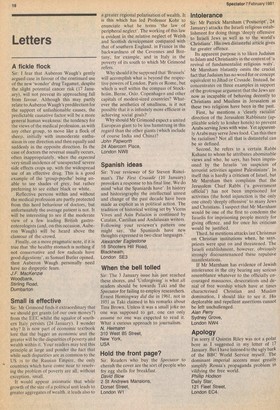Small is effective
Sir: Mr Grimond finds it extraordinary that we should get giants (of our own money?) from the EEC whilst the squalor of southern Italy persists (24 January). I wonder why? It is now part of economic textbook lore that the bigger an economic unit the greater will be the disparities of poverty and wealth within it. Your readers may test this principle at large and ponder the fact that while such disparities are as common to the US as to the Russian Empire. the only countries which have come near to resolving the problem of poverty are all, without exception, small.
It would appear axiomatic that while growth of the size of apolitical unit leads to greater aggregates of wealth, it leads also to a greater regional polarisation of wealth. It is this which has led Professor Kohr to enunciate what he terms 'the law of peripheral neglect'. The working of this law is evident in the relative neglect of Welsh and Scottish development compared with that of southern England, in France in the backwardness of the Cevennes and Brittany, for example, and in Italy in the poverty of its south to which Mr Grimond refers, Why should it be supposed that 'Brussels' will accomplish what is beyond the respective powers of London, Paris or Rome, but which is well within the compass of Stockholm, Berne, Oslo, Copenhagen and other capitals of modest-sized countries? Whatever the aesthetics of smallness, is it not possible that it is infinitely more efficient in achieving social goals?
Why should Mr Grimond expect a united European giant to be less hamstrung in this regard than the other giants (which include of course India and China)?
John Papworth 24 Abercorn Place, London NW8






































 Previous page
Previous page